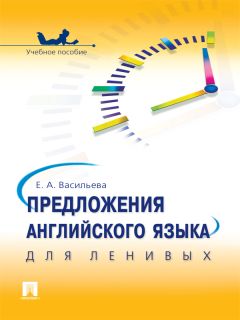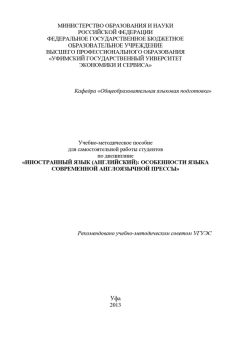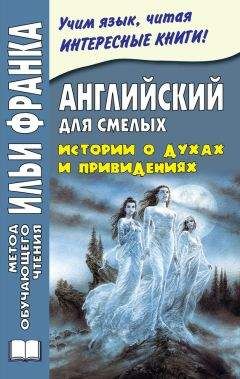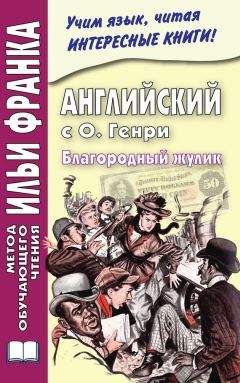Денис Шевчук - Английский для экономистов (учебник английского языка)
Все авторские права соблюдены. Напишите нам, если Вы не согласны.
Описание книги "Английский для экономистов (учебник английского языка)"
Описание и краткое содержание "Английский для экономистов (учебник английского языка)" читать бесплатно онлайн.
Английский для экономистов – учебное пособие предназначено для студентов экономических специальностей и рассчитано на лиц, обладающих знанием нормативной грамматики английского языка и имеющих словарный запас в 2000 лексических единиц.
Английский язык для экономистов состоит из 8 разделов, охватывающих широкий круг тем по экономике и бизнесу: экономика, организация, бизнес, менеджмент, маркетинг, реклама, деньги, банки, финансы, бухучет, аудит, резюме экономиста на английском языке и др. Все тексты взяты из оригинальных английских и американских источников. Разделы (равно как и тексты) могут прорабатываться в представленной последовательности или выборочно – в зависимости от целей, задач и уровня подготовки группы, изучающей английский для экономистов. Это эффективный учебник английского языка для экономистов (деловой английский для экономистов).
1. The text you’ve read gives a very brief view of the history of Economics. What other names (schools, theories) can you give to continue the story?
TEXT 3
Read the text. Define the main idea of each paragraph.
THE ECONOMIC SYSTEM
There are many forms of economic order, ranging from the mixed private enterprise system to partially or completely controlled economies. Regardless of their form, however, economic system is the system that a society uses for allocation and distribution of scarce resources. Private enterprise means that decisions about what and how much to produce are left to the discretion of owners and managers. In controlled economies such decisions are the responsibility of some governmental agency. There is, of course, no economy today that is completely free of governmental influence, nor is this condition necessarily undesirable. There are many beneficial services and protections available from government. The question then is a matter of degree. Irrespective of the form of economic order, it performs certain valuable functions in the life of organizations of all types.
Among the functions of the economic order the most important one is to provide some means of resource allocation. In a private enterprise this function is basically performed by the price mechanism. This simply means that demand for and supply of goods and services interact to set their market price. In the case of regulated utilities, there are governmental agencies such as public service commissions that determine the rates that may be charged by utility companies. These rates are set at the level that will allow a fair return on investments made by the companies. This form of regulated monopoly is considered, on balance, preferable to unchecked competition. This is true because of efficiency reasons. In taking actions in the area of employment, government is attempting to control the economy in such a fashion as to help the business community operate at the level of production that will yield full employment.
Without a system of distribution economy simply could not exist. A major part of this distribution system is credit. Economy flourishes on credit or extended methods of payment. Such a system literally affects every link in the distribution chain from the supplier of raw materials to the ultimate consumer. Without this vital financing function being performed, the economy would doubtless be forced to a lower order of production.
Economic goals for a nation include price stability, full employment, economic growth, and equitable distribution of income. Price stability contributes to the efficient allocation of resources and facilitates long-term planning. Full employment means that jobs are available for those seeking work. Higher standards of living require increased output per person (economic growth per capita). An equitable distribution of income means that the fruits of the economy are divided in a way that seems fair to the majority of the people. With the long-run trend toward a more sophisticated, highly integrated economic system, it is becoming increasingly important for an individual decision maker to be aware of the macroeconomic environment.
1. What is a system?
2. What are three main concepts of a system? What do they imply?
3. What is an economic system?
4. What functions does economic order perform?
5. What do economic goals for a nation usually include?
TEXT 4
Read the text. Make up the plan and retell the text using your plan.
PROLOGUE TO ECONOMICS
There is almost universal agreement that economies are becoming more complex every year and that an understanding of how an economy works is more important than ever before. For someone who is just beginning to study economics, the task indeed appears to be a difficult one. Economics is the study of the way in which mankind organizes itself to solve the basic problem of scarcity. All societies have more wants than resources, so that a system must be devised to allocate these resources between competing ends. In a very real sense, the complexity of the economy makes it difficult to decide exactly where to start. Simultaneously, production is taking place, goods and services are being allocated, and a great number of market participants are being motivated by a diverse set of goals. In addition, there is the complex financial system in which individuals, firms, and governments borrow and lend funds.
Economics is divided into two major branches: macroeconomics and microeconomics. Macroeconomics is the study of behavior of the economy as a whole with emphasis on the factors that determine growth and fluctuations in output, employment, and the level of prices. Macroeconomics studies broad economic events that are largely beyond the control of individual decision makers and yet affect nearly all firms, households, and other institutions in the economy. Specialists in macroeconomics are particularly interested in understanding those factors that determine inflation, unemployment, and growth in the production of goods and services. Such an understanding is necessary in order to develop policies that encourage production and employment while controlling inflation.
The other major branch of economics is microeconomics. Microeconomics is the study of behavior of individual units within the economy. The division of economics has resulted from the growing complexity and sophistication of economic research.
These two approaches and the topics they include are in fact interdependent. Individuals and firms make their decisions in the context of the economic environment, which has an impact on the constraints the decision makers face as well as their expectations about the future. At the same time, when taken as a whole, their decisions determine the condition of the overall economy. A good understanding of economic events and an ability to forecast them require knowledge of both individual decision making and the way in which individuals react to changes in the economic environment.
1.Economies are becoming more complex every year. Why?
2.What is the main division of economics?
3.What is macroeconomics «responsible for»?
4.What does microeconomics deal with?
TEXT 5
1.In what context can we use the word environment?
2.What elements of the environment can you mention?
3.Which ones are of the most importance?
Read the text. Be ready to define the key-sentence(s) of each paragraph. Explain your choice.
Read
MACRO ENVIRONMENT
Macro environment is the network of systems composed of culture, political and economic forces, technology, skill mixes, and consumer groups; a source of opportunities and constraints for the organization. Once the organization has built its product or defined its service, it must distribute it to consumer client groups who have wants and needs that they attempt to satisfy through the consumption of such products and services.
Every organization exists within an extensive and complex environmental network. Organizational environment refers to all groups, norms, and conditions with which an organization must deal. It includes such things as the political, cultural, economic, religious, educational, and like systems that affect an organization and which in turn affected by it. Table 1 provides a summary of environmental subcomponents.
Table 1.
Culture, composed of values, norms, artifacts, and accepted behavior patterns, affects the way the organization is formed and how it operates once in existence. Indeed, one must recognize that all of the decisions made in an organization are culture bound; i.e., they are a reflection of all these components of culture. Societal norms are those standards that mold behavior, attitudes, and values of those members who constitute a society. They come from laws, customs, religious teachings, and common practice. They are standards because members take them into account in their decisions and behavior. Dress, speech, what is considered to be in good taste, and the general understanding of what is right and wrong are all affected by societal norms. At the same time, almost every institution in a society is capable of transfusing some of its values, norms, and behavior patterns into its environment. Organizations can hardly afford to ignore such a vital ingredient in its macro environment.
Political forces are classified as the form and role of government in a society. The source of law and other regulations that restrict or at least affect the organization, the political system also is the source of a rich variety of services for the organization. These services range from fire and police protection to the provision of recreational areas. When one thinks of the governmental sector, one might be likely to think of its negative connotation and red tape. Although there is an element of restriction originating from the political sector, it is by no means dominant. Even though the presence of the political system has served to complicate management’s job, it has also made it easier at the same time. By knowing that all similar organizations must observe the same rules and regulations, managers can experience an element of certainty in their activity. They know that they have a source of protection and redress when violations do occur.
The political system is coupled with the economic system. The type of economy a society has can range from private enterprise to planned economy. Whatever its form, the economic system is concerned with the allocation of scarce resources and the provision of some form of distribution. It is, in practice, quite difficult to separate the political and economic systems from each other.
The macro environment is also the source oftechnology – the machines, techniques, and methods required for production and distribution. To be able to compete successfully, organizations must have access to modern technology. It is simply not feasible for an organization to compete unless an adequate level of technology is available to it. It can be safely stated that organization success is measured by the ability of the organization to adjust to and to employ technological innovations. Among their responsibilities, managers today must count the obligation to maintain a spirit of creativity and ingenuity among members so that continued progress on the technological front can be made. The ever-growing shortages of resources of all types are but one indication of the seriousness of this obligation.
Skill mix in the labor force is likewise an important facet of an organization’s macro environment. All organizations depend to some extent on a supply of labor that possesses the skill and ability to perform the work necessary to attain objectives. Consequently, labor market conditions and skill mixes are crucial to success.
The consumers are the ultimate arbiters of the organization’s success, for it is they who make the critical choices to consume or not to consume an organization’s output. Without the income (in whatever form) that results from this consumption, the organization is doomed to a relatively short life. This means that managers must be more aware of and sensitive to the total environmental complex of their organization in order to develop and implement plans for successfully coping with it. Otherwise, there is little chance for success, for по longer willyesterday’s methods based on a placid environment serve in today’s turbulent outside world.
1.What is macro environment?
2.Why is macro environment a source of constraints and opportunities for an organization?
3.What is «the most influential element» of the environment?
4.What element can people influence?
TEXT 6
Read the following text. Define its main topic. Divide the text into logical parts. Give the title to the text and to each part. Explain the meanings of the words and phrases which have been highlighted.
The study of economics would be incomplete without an understanding of the nation’s role in the world economy. The study of the world economy is known as “international economics”. International economics embraces two broad areas of interest: international trade and international finance. World trade has been gaining increasing significance among nations. Why do nations trade? The answer is that nations have different quantities and qualities of economic resources and different ways of combining them. As a result, each country can produce certain goods more efficiently, or at relatively lower costs, than others. This idea can be stated somewhat differently. Imagine a world consisting of only two countries, each producing the same goods. Under such circumstances, the alternative or opportunity cost to each country of producing more of one good is the amount of the second good that must be sacrificed. In view of this, which of the two goods should the countries produce? The answer is that each should specialize. When two parties engage, the sacrifice that each makes to obtain something from the other is called the “terms of trade”. For example, in order to buy a book, you might have had to give up five visits to the movies. Your terms of trade, therefore, are 5 movies = 1 book. The terms of trade for a given transaction equal the number of units of goods that must be given up for one unit of goods received by each party to the transaction. Or in other words, terms of trade are defined as the ratio of the prices of its export commodity to the price of its import commodity. Despite the fact that trade is of great importance for each nation, all countries impose restrictions of one form or another to protect some of their domestic industries. The restrictions may be of several types: tariffs, import quotas, nontariff barriers. Tariffs are customs duties or taxes imposed by a government on the importation of a good. Tariffs may be (1) specific, in the form of a tax per unit of the commodity, or (2) ad valorem, based on the value of the commodity. Import quotas are laws that limit the number of units of a commodity that may be imported during a specified period. Nontariff barriers are any laws or regulations, other than tariffs, that nations impose in order to restrict imports. For instance, to “protect the health and safety” of their citizens, many countries establish higher standards of quality for various kinds of imported goods than for similar goods produced domestically.
Ex. 13. Insert the missing words given below.
Consumption, take account of, manager, state, environment, include, capital, macroeconomics, economy
In a simplistic … in which individuals or families produce primarily for their own …, economy-wide phenomena are of little importance. On the other hand, the complex financial … and production process that characterizes an advanced economy in the 1980s requires individual decision makers … both the current economic environment and forecasts of the economic environment. Decisions that require an understanding of the overall functioning of the economy … business decisions such as whether firm should sell bonds or stock to raise new … and individual decisions such as whether to change jobs or purchase a new home. Whether a person «wears the hat» of an entrepreneur, a business …, or a head of a household, it is important to be aware of the … of the economy as a whole. Specific factors that determine the advisability of these and other decisions are studied as part of … .
Подписывайтесь на наши страницы в социальных сетях.
Будьте в курсе последних книжных новинок, комментируйте, обсуждайте. Мы ждём Вас!
Похожие книги на "Английский для экономистов (учебник английского языка)"
Книги похожие на "Английский для экономистов (учебник английского языка)" читать онлайн или скачать бесплатно полные версии.
Мы рекомендуем Вам зарегистрироваться либо войти на сайт под своим именем.
Отзывы о "Денис Шевчук - Английский для экономистов (учебник английского языка)"
Отзывы читателей о книге "Английский для экономистов (учебник английского языка)", комментарии и мнения людей о произведении.



















